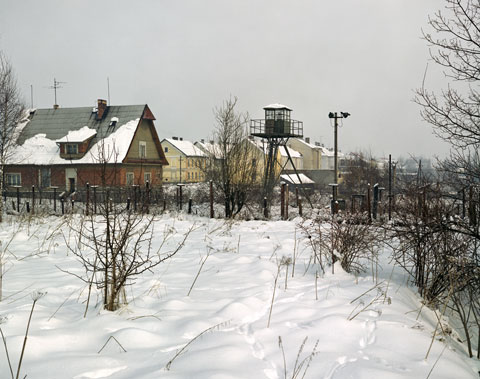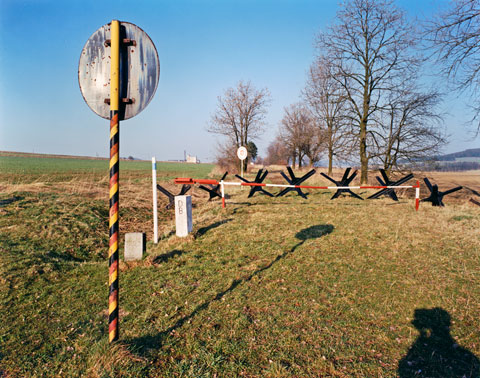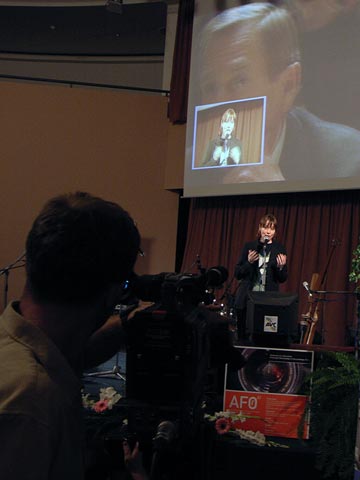
Czech/Austrian border 1987 (4×5 film) — © Brian Rose
It is with great sadness that I note the passing of Vaclav Havel, playwright, political dissident, and former president of Czechoslovakia and the Czech Republic. When I traveled the Iron Curtain in 1985 and 1987, Havel and others who resisted the communist/Soviet hegemony of eastern Europe, was always in my thoughts. I skirted the Cold War border from the relative luxury of my rental car while Havel languished in prison or house arrest smuggling out statements and manifestos.
One such fundamental experience, that which I called “antipolitical politics,” is possible and can be effective, even though by its very nature it cannot calculate its effect beforehand. That effect, to be sure, is of a wholly different nature from what the West considers political success. It is hidden, indirect, long-term, and hard to measure; often it exists only in the invisible realm of social consciousness, conscience, and subconsciousness, and it can be almost impossible to determine what value it assumed therein and to what extent, if any, it contributes to shaping social development. It is, however, becoming evident-and I think that is an experience of an essential and universal importance-that a single, seemingly powerless person who dares to cry out the word of truth and to stand behind it with all his person and all his life, ready to pay a high price, has, surprisingly, greater power, though formally disfranchised, than do thousands of anonymous voters.

Czech/German border 1985 (4×5 film) — © Brian Rose
It is becoming evident that even in today’s world, and especially on this exposed rampart where the wind blows most sharply, it is possible to oppose personal experience and the natural world to the “innocent” power and to unmask its guilt, as the author of The Gulag Archipelago has done. It is becoming evident that truth and morality can provide a new starting point for politics and can, even today, have an undeniable political power. The warning voice of a single brave scientist, besieged somewhere in the provinces and terrorized by a goaded community, can be heard over continents and addresses the conscience of the mighty of this world more clearly than entire brigades of hired propagandists can, though speaking to themselves. It is becoming evident that wholly personal categories like good and evil still have their unambiguous content and, under certain circumstances, are capable of shaking the seemingly unshakable power with all its army of soldiers, policemen, and bureaucrats. It is becoming evident that politics by no means need remain the affair of professionals and that one simple electrician with his heart in the right place, honoring something that transcends him and free of fear, can influence the history of his nation.
Yes, “antipolitical politics” is possible. Politics “from below:’ Politics of man, not of the apparatus. Politics growing from the heart, not from a thesis. It is not an accident that this hopeful experience has to be lived just here, on this grim battlement. Under the “rule of everydayness” we have to descend to the very bottom of a well before we can see the stars.
— Vaclav Havel

Suzanne Vega performs for Vaclav Havel — © Brian Rose
Some years later I found myself in Prague. It was 1990, one year after the Velvet Revolution and the fall of the Berlin Wall. I was meeting up with Suzanne Vega who was playing there and in East Berlin–incandescent performances both of them, fed by the still uncontaminated spirit of liberation in the air. I wrote here about them in my journal. I remember walking from the train station to the central square of Prague behind a group of teenagers singing the dut dut duts from Suzanne’s song Tom’s Diner. Again, years later, I met up with Suzanne in Olomouc in what was now the Czech Republic as she performed Tom’s Diner for Vaclav Havel over a video linkup. Havel was a fan, as he was of the old Velvet Underground and Lou Reed.
Here is, perhaps, the finest tribute to Havel on the 20th years of the Velvet Revolution in Prague on 17 November 2009: